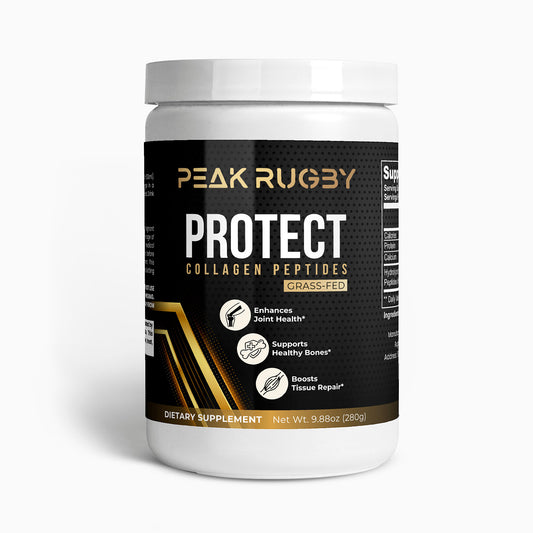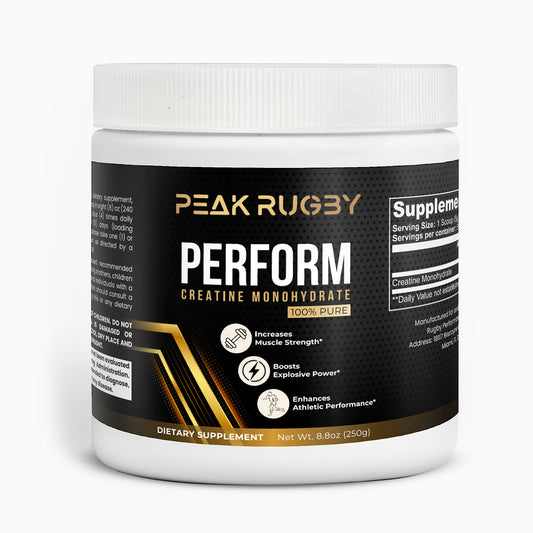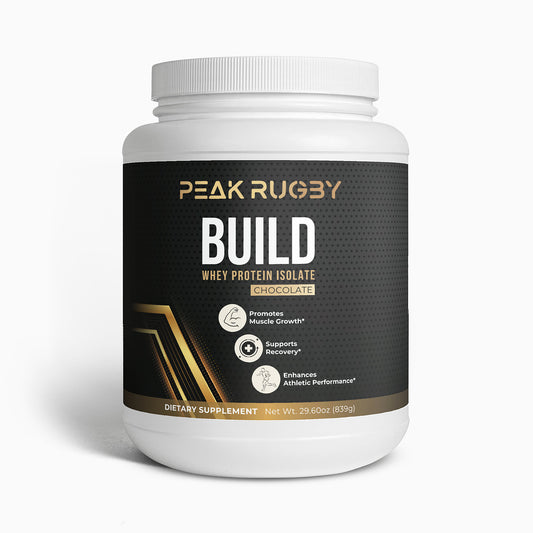Supplements can be powerful tools for performance—but only when used with clarity, purpose, and the right foundation.
Too often, rugby athletes grab random products without understanding why they’re taking them, what they do, or how they should be used. That’s why we created the Peak Rugby Supplements Series—to give you clear and honest education around the supplements that actually matter.
In Part 1 of the series, we’re diving into Creatine Monohydrate—what it is, how it works, and why it’s one of the most effective and well-researched supplements for athletes of all levels.
Here’s what the full series looks like:
- Part 1: PERFORM – Creatine Monohydrate
- Part 2: BUILD – Whey Protein Isolate
- Part 3: PROTECT – Grass-Fed Collagen Peptides
- Part 4: RECOVER – L-Glutamine Powder
- Part 5: SUPPLEMENT STRATEGIES – Stack Smart, Perform Better
When it comes to safe, well-researched supplements that actually work, creatine monohydrate sits at the top of the list.
But despite its proven benefits, many athletes and parents still hesitate—mainly because of lingering myths and misunderstandings.
So let’s break it all down.
WHAT IS CREATINE?
Creatine is a naturally occurring compound found in your body—primarily in muscle tissue. It’s made from three amino acids: arginine, glycine, and methionine, and about 95% of it is stored in skeletal muscle.
You also get small amounts from foods like red meat and fish, but it’s tough to consume enough through diet alone to see performance benefits. That’s where supplementation comes in—especially in high-intensity sports like rugby.
WHAT DOES CREATINE DO?
Creatine plays a major role in the ATP-PC energy system, which fuels explosive movements like sprinting, tackling, rucking, and lifting. ATP (adenosine triphosphate) is your body’s quick-burst energy currency—but you only store a limited amount.
Supplementing with creatine allows you to recycle ATP faster, meaning:
- More explosive power
- Better high-intensity output
- Shorter recovery between sprints and gym sets
- Improved muscular endurance during repeated efforts
WHY CREATINE MATTERS FOR RUGBY ATHLETES
Rugby is a stop-and-go sport with repeated bouts of sprinting, tackling, jumping, and scrummaging. You need power, speed, strength, and resilience—and that’s exactly what creatine helps deliver.
For rugby players, creatine monohydrate can:
- Increase strength and muscle output
- Enhance power in collisions and scrums
- Improve sprint performance and acceleration
- Speed up recovery during training or matches
- Support lean muscle gain (especially important during development phases)
BENEFITS BEYOND RUGBY
Creatine isn’t just for athletes. It has growing evidence supporting neurological, cognitive, and longevity benefits, making it one of the few supplements that:
- Supports brain health (shown to enhance memory and reduce mental fatigue)
- Aids muscle preservation as you age
- Helps with recovery from injury or surgery
- May reduce risk of certain neurological diseases like Parkinson’s and ALS
COMMON MISCONCEPTIONS (AND THE TRUTH)
MYTH 1: Creatine causes kidney damage.
FALSE. This myth comes from misunderstanding how creatinine (a waste product) is measured. Dozens of long-term studies confirm that creatine is safe in healthy individuals.
MYTH 2: Creatine causes dehydration or cramps.
FALSE. Research shows no increased risk of cramping or dehydration—especially when proper hydration is maintained.
MYTH 3: Creatine is a steroid.
FALSE. Creatine is an amino-acid-based compound, not a hormone. It’s completely legal and naturally found in the body and food.
MYTH 4: Creatine leads to water weight only.
PARTLY TRUE. Yes, creatine causes muscle cells to retain water—but that’s intracellular (inside the muscle), not bloating. It helps create a more hydrated, anabolic environment for strength and growth.
IS CREATINE SAFE?
Yes. Creatine monohydrate is the most studied supplement in sports nutrition history.
- Over 1,000 peer-reviewed studies
- Used safely by athletes of all ages (even teens and older adults)
- Endorsed by organizations like the International Society of Sports Nutrition
When taken at the recommended dose (3–5g/day), it is safe, effective, and delivers measurable performance improvements.
WHAT IS CREATINE MONOHYDRATE?
There are several forms of creatine (creatine HCl, buffered creatine, creatine ethyl ester), but creatine monohydrate is the gold standard:
- Most researched
- Most bioavailable
- Most affordable
- Most effective
No fancy tweaks or gimmicks needed.
WHY CHOOSE PEAK RUGBY PERFORM?
PERFORM by Peak Rugby is a premium creatine monohydrate supplement built specifically for rugby athletes who demand power, performance, and purity.
- 100% Pure Creatine Monohydrate
- No fillers, flavors, or additives
- Unflavored and easy to mix
- Lab-tested for quality and consistency (see Certificate of Analysis here)
Whether you’re preparing for 7s in the summer or 15s season in the fall, PEAK RUGBY PERFORM gives you the edge to train harder, recover faster, and dominate on the field.

HOW TO USE IT
- Loading Phase (Optional): 20g/day for 5–7 days split into 4 doses
- Maintenance Phase: 3–5g daily
- When to Take: Anytime. Some prefer post-workout with carbs or protein, but consistency is key
Pro Tip: You don’t need to cycle off creatine. Take it daily—even on rest days—for best results.
FINAL THOUGHT
Creatine isn’t hype—it’s science-backed, athlete-proven, and rugby-necessary. PEAK RUGBY PERFORM delivers it in its cleanest, most effective form.
If you’re serious about building strength, boosting explosive power, and supporting your long-term health—PEAK RUGBY PERFORM belongs in your daily routine.
WANT TO GET STRONGER AND RECOVER FASTER?
Enter your email below to join the newsletter and get 15% off your first supplement order—plus free weekly tips straight to your inbox:
- Monday Training Tip: Strength, recovery, mobility, and performance routines
- Thursday Nutrition Tip: Meals, macros, supplements, and fueling strategies
If you found this article helpful, don’t forget to:
- Like and share this post with your teammates and fellow rugby fans
- Bookmark the blog to stay updated on the next rounds
- Follow @gopeakrugby on X and Facebook and subscribe to our Youtube Channel for more rugby analysis, match recaps, and insights


















